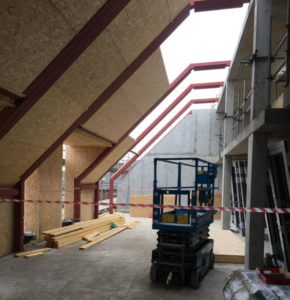Companies sentenced after worker hospitalised for nearly two weeks
Two construction companies have been sentenced after a worker was hospitalised for nearly two weeks after being struck by a 124kg panel.
The man was working as a lift supervisor at a construction site at Eskdale Terrace, Jesmond, Newcastle, on 22 January 2020.
He had been using a tower crane to lift a structured insulated panel (SIP). During the lifting operation, the SIP struck steelwork and fell on top of the worker.
He spent 13 days in hospital following the incident after fracturing his collarbone, shoulder blade, left ankle and left rib.
An investigation by the Health and Safety Executive (HSE) found Tolent Construction Limited, the principal contractor, had failed to properly plan, manage and monitor the construction phase. This resulted in a failure to ensure a suitable and sufficient lift plan was in place for the lifting of individual SIPs. Most importantly, the lift plan failed to stipulate how the individual SIPs were to be safely lifted and failed to consider proximity hazards or how the SIPs would be adequately controlled during the lifting operation.

HSE’s investigation also identified Clad Build UK Limited (trading as SIP Build UK), as the contractor responsible for the design, supply and installation of the SIPs. Clad Build UK Limited failed to plan, manage and monitor the work or to provide the necessary information and instruction to workers on how to prepare the SIPs for lifting. Clad Build UK Limited also failed to ensure effective supervision and monitoring of work being undertaken by a sub-contractor working under its control and to comply with requests for information from the principal contractor.
HSE guidance can be found at: Managing health and safety in construction. Construction (Design and Management) Regulations 2015. Guidance on regulations L153 (hse.gov.uk) and here: Lifting Operations and Lifting Equipment Regulations (LOLER) 1998
Tolent Construction Limited of Grey Street, Newcastle, pleaded guilty to contravening Regulation 13 (1) of the Construction (Design and Management) Regulations 2015. The company was fined £1,000 and ordered to pay £8,468.50 in costs at Newcastle Crown Court on 17 April 2023.
Clad Build UK Limited of Foxbridge Way, Normanton Industrial Estate, Normanton, West Yorkshire, pleaded guilty to contravening Regulation 15 (2) of the Construction (Design and Management) Regulations 2015. The company was fined £12,000 and ordered to pay £45,000 in costs at Newcastle Crown Court on 17 April 2023.
HSE inspector Stuart Whitesmith said: “HSE will not hesitate to take enforcement action against those that fall below the required standards. This case should raise awareness of the dangers of failing to properly plan and safely carry out this type of lifting operation. SIPs are increasingly used in the construction industry and all contractors should be aware of the need to suitably plan, manage and monitor their safe installation.”
Notes to Editors:
- The Health and Safety Executive (HSE) is Britain’s national regulator for workplace health and safety. We prevent work-related death, injury and ill health through regulatory actions that range from influencing behaviours across whole industry sectors through to targeted interventions on individual businesses. These activities are supported by globally recognised scientific expertise. hse.gov.uk
- More about the legislation referred to in this case can be found at: legislation.gov.uk/
- HSE news releases are available at http://press.hse.gov.uk
- For guidance please go to: Managing health and safety in construction. Construction (Design and Management) Regulations 2015. Guidance on regulations L153 (hse.gov.uk) or here: Lifting Operations and Lifting Equipment Regulations (LOLER) 1998
- Had Tolent Construction Limited not entered administration prior to the sentencing hearing, the recorder stated the company would have received a £1m fine. James Wood KC added there was no basis that Tolent Construction Limited was seeking to deploy a voluntary liquidation to avoid a fine. Therefore in the circumstances, he concluded that to seek to impose a fine of £1m would have been wrong.